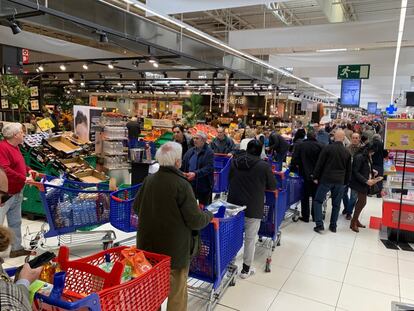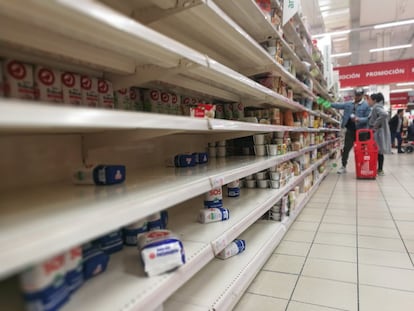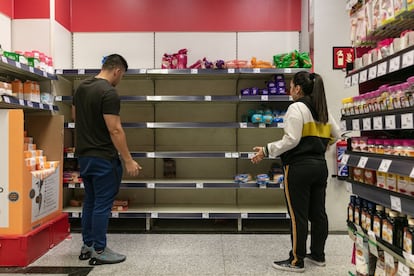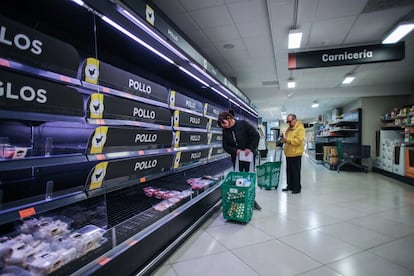Coronavirus outbreak sparks panic buying in Madrid
Customers have been lining up to stock up on supplies as tougher measures to contain the spread of Covid-19 come into effect in the region

The coronavirus outbreak in Madrid has sparked panic buying at supermarkets across the capital. On Tuesday, customers waited in long lines to stock up on products such as pasta, rice, oil, milk and toilet paper, leaving many shelves empty.
“We are running out of products. This began yesterday [on Monday] and now we are overwhelmed,” said Wender Montilla, a worker at the Alcampo supermarket in the Madrid neighborhood of Tetuán, on Tuesday.

The surge in demand also led to unusually long check-out lines. “Normally, it takes me 20 minutes to do the shopping. Today it has been an hour. Most of that time was spent waiting at the cash register,” said 50-year-old shopper Marco Antonio, who admitted he was “a little afraid” of the coronavirus crisis.
Another shopper, Silvia Fernández, said that while she was not worried about the virus, other “people are invaded by fear.” “So what have I done? The same as everyone, headed like sheep to empty the shelves,” she explained.
By Wednesday afternoon, the number of confirmed Covid-19 cases in the Madrid region had risen to 1,024 and the death toll to 31, out of a national total of 2,109 infections and 49 deaths. In an effort to contain the spread of the virus, all education facilities in the region were closed on Wednesday, while many workers began working from home.

The rush to buy staple goods amid coronavirus fears and the new containment measures affected supermarkets in all areas of Madrid. In the neighborhood of Ciudad Lineal, customers at Mercadona lined up with shopping carts filled to the brim; in the El Corte Inglés store in Arapiles, in downtown Madrid, store workers struggled to keep the shelves stocked; and in the Chamberí neighborhood even the manager of the Carrefour supermarket placed himself behind a check-out counter to help deal with the lines of customers. “I have never seen anything like it,” said a worker at Carrefour.
Despite the unusual scenes, supermarkets chains said there is no risk of a supply shortage. “Spain has one of Europe’s most efficient food-distribution systems, and it is prepared for extraordinary situations like the one caused by the current Covid-19 crisis,” said the Spanish Association of Distributors, Self-Service and Supermarkets (Asedas).
On Tuesday, Juan Roig, the president of the Mercadona supermarket chain, called for calm: “If there’s something that can worsen the situation, it’s fear.” Roig added that while panic buying was also being seen in the Basque city of Vitoria, where schools have also closed due to the coronavirus outbreak, “the situation in the rest of Spain is completely normal.”

“Similar situations to this crisis have happened in the national and international sector in the past, and we have always had enough products to supply all our clients. And today we also have them,” he added. Mercadona also explained that it was “normal” for parents to stock up on food ahead of the school closures, given that children would spend more time eating at home.
But days before the school closure in Madrid was announced, the consultancy group Nielsen had already detected a rise in the sales of popular products. In the last week of February, sales rose 8.3% from the same period in 2018 thanks in large to the demand for non-perishable items (rice, pasta and legumes), and personal hygiene products including antibacterial gel. According to Nielsen, the sale of rice and legumes jumped 45% and 47% respectively, while the sale of pasta products rose by 30%.
Sources from the distribution sector said that images of empty shelves – which went viral on social media – corresponded to “specific problems” in some stores, but were not an indication of a deeper supply problem.
Chinese business owner: “If there’s no health, there’s no money”

Many Chinese-run stores and restaurants in Madrid have closed their doors amid the coronavirus outbreak in the region. In the Usera neighborhood, known as the Chinatown of Madrid, 80% of shops have shut.
“Spaniards are not taking protection measures, it’s as if the coronavirus didn’t exist,” said Paco Quian, the vice-president of the Spanish Association of Chinese Businesspeople. “Chinese people have restaurants, which are a very large site of contagion. That’s why many have closed for 15 days.”
“We all have children and elderly people at home,” said Beini Qain, a manager at JC law firm, which advises hundreds of businesses in Madrid. “Some have gone to China on vacation because the situation is controlled there and here it is not.”
“We are thinking about our health,” he added. “If there is no health, there is no money.”
English version by Melissa Kitson.
Tu suscripción se está usando en otro dispositivo
¿Quieres añadir otro usuario a tu suscripción?
Si continúas leyendo en este dispositivo, no se podrá leer en el otro.
FlechaTu suscripción se está usando en otro dispositivo y solo puedes acceder a EL PAÍS desde un dispositivo a la vez.
Si quieres compartir tu cuenta, cambia tu suscripción a la modalidad Premium, así podrás añadir otro usuario. Cada uno accederá con su propia cuenta de email, lo que os permitirá personalizar vuestra experiencia en EL PAÍS.
¿Tienes una suscripción de empresa? Accede aquí para contratar más cuentas.
En el caso de no saber quién está usando tu cuenta, te recomendamos cambiar tu contraseña aquí.
Si decides continuar compartiendo tu cuenta, este mensaje se mostrará en tu dispositivo y en el de la otra persona que está usando tu cuenta de forma indefinida, afectando a tu experiencia de lectura. Puedes consultar aquí los términos y condiciones de la suscripción digital.








































